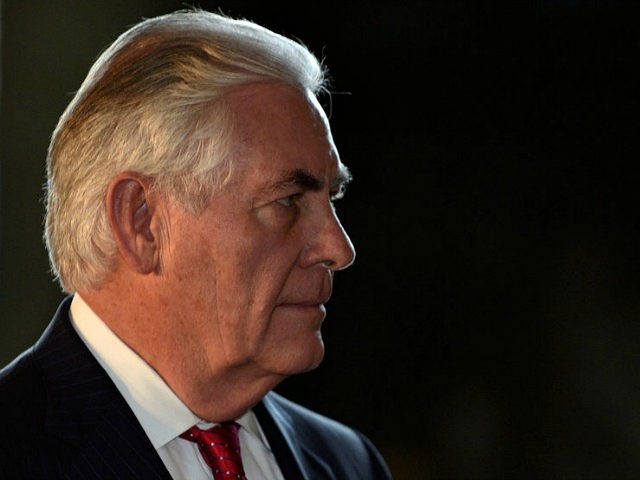Secretary of State Rex Tillerson has arrived in Tokyo, Japan, for the first leg of his three-nation tour of Asia, emphasizing the need for a new approach to curbing North Korea and pressuring China to take a stronger economic stand against the rogue regime in Pyongyang.
Tillerson’s first public engagement in Japan was a joint press conference with his Japanese counterpart, Foreign Minister Fumio Kishida. Tillerson branded the approach to Pyongyang by both the Obama and Bush administrations a failure, noting that “the United States provided $1.35 billion in assistance to North Korea as an encouragement to take a different pathway” and got no results on moderating the communist Kim regime.
He directed the government of China, North Korea’s closest and most formidable ally, to pressure North Korea into adhering to international legal standards. “We look to China to fulfill its obligations and fully implement the sanctions called for,” he told reporters.
“In the face of this ever-escalating threat, it is clear that a different approach is required,” Tillerson told reporters. “The purpose of – part of the purpose of my visit to the region is to exchange views on a new approach.”
Tillerson also emphasized the need for “trilateral cooperation” with an increasingly unstable South Korea, which just impeached pro-American president Park Geun-hye and is set to elect leftist rival Moon Jae-in in a special May presidential election. “Trilateral cooperation allows our three nations to coordinate actions on major regional and global problems, and more effectively counter the threats posed by North Korea,” Tillerson said. President Donald Trump has personally emphasized the need for strengthening bilateral ties and rejected the use of multilateral talks as a diplomatic device.
On his end, Kishida emphasized that, during talks with Tillerson, the two chief diplomats were “in sync” on how to approach the region’s most complicated problems.
“On North Korean question, we shared the position that we absolutely cannot condone nuclear as well as missile development by North Korea,” Kishida said, adding that both sides “discussed on [sic] the important role that China can play in this regard.” Kishida also thanked Tillerson and the U.S. government generally for their support in the East China Sea where Beijing has claimed the Japanese Senkaku Islands.
Tillerson will meet Japanese Prime Minister Shinzo Abe on Thursday before flying to South Korea.
Tillerson will arrive in China on Saturday, March 18, and meet with Chinese Foreign Minister Wang Yi. He is expected to bring the same message of responsibility for the North Korean regime to Beijing as he did to Japan.
The Chinese Foreign Ministry, however, is attempting to convince reporters that they expect minimal conflict during Tillerson’s visit. During a press event on Wednesday, Premier Li Keqiang said he was “optimistic about the future of China-US relations” and insisted China is committed to enforcing United Nations resolutions against North Korea.
“It is true that recently the situation on the Korean Peninsula and in Northeast Asia more generally has become tense,” Li said, urging “all the parties concerned will work together to de-escalate the situation, get issues back on the track of dialogue and try to find lasting solutions. It’s common sense that no one wants to see turbulence at his doorstep.”
Foreign Ministry spokeswoman Hua Chunying was clearer in condemning both North Korea and South Korea – and, by proxy, the United States – for escalating tensions in the region. “The current situation on the Korean Peninsula is highly sensitive and complex. If relevant sides truly hope to see peace and stability in this region, they should apply the brake and put out the fire, instead of adding fuel to the flame,” she told reporters Tuesday, clearly intending to exclude China from her list of “relevant parties.”
As usual, Chinese state media outlets went further in claiming China has only a small role to play in controlling North Korea. “Some Western media outlets blamed the current chaos on China’s friendly policy toward North Korea, arguing that Beijing should impose tougher sanctions on Pyongyang to curb the latter’s nuclear ambitions.
This is unfair and groundless,” the Global Times protested this week. “By shifting the full responsibility on Beijing, the Western countries, especially the US, attempt to exploit the nuclear issue to strategically contain China in the region. This makes the already chaotic situation more sensitive and complicated.”
“The US cares more about its strategic aims than regional peace, and has failed to play an active role that it is supposed to as a major power in promoting peace and stability on the peninsula,” the Times concludes.
China provides North Korea with “90 percent of its fuel and 80 percent of its general use goods,” according to recent reports. Beijing recently halted all shipments of coal from North Korea for the rest of the year, claiming it a necessary move to adhere to UN sanctions. The announcement followed the assassination of Kim Jong-nam, dictator Kim Jong-un’s brother, in Malaysia using VX agent, a weapon of mass destruction. Malaysian authorities have traced the killers’ ties back to North Korea.

COMMENTS
Please let us know if you're having issues with commenting.